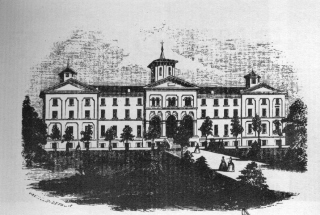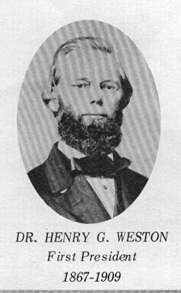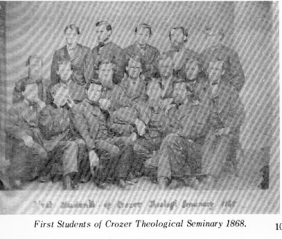Crozer Theological Seminary
John P. Crozer had a very sensitive conscience about how to use his money. He gave liberally to his church, charitable institutions and causes in the area. He wanted to establish some educational enterprise that would benefit the largest possible section of the public. He established a "normal school" in 1858. He constructed a large stone building known as "Old Main" on the now Crozer-Chester Medical Center campus. His efforts were challenged by an epidemic of scarlet fever followed by smallpox which decimated faculty and student body alike.
 When he founded the school, his intention had been to give underprivileged but worthy young people an opportunity to acquire a good education in order to become good teachers. His hopes were frustrated by some wealthy parents, who saw in his school an opportunity to obtain good educations for their children at a nominal cost. Soon the normal school effort lapsed.
When he founded the school, his intention had been to give underprivileged but worthy young people an opportunity to acquire a good education in order to become good teachers. His hopes were frustrated by some wealthy parents, who saw in his school an opportunity to obtain good educations for their children at a nominal cost. Soon the normal school effort lapsed.
The large building was not used consistently for the next few years though it was used as a prison hospital during the Civil War. After the hospital was set apart for the reception of Confederate wounded, a picket-fence, twelve feet in height, was built, surrounding the grounds, and guards were stationed to prevent the escape of convalescent prisoners of war. Notwithstanding the vigilance of the authorities, one dark stormy night in August, 1863, Capt. Edward Shay, of the Sixteenth Mississippi Regiment, and Lieut. Davis, of Gen. Trimble's staff, evaded the guard and escaped.
The hospital furnished accommodation for more than six thousand wounded soldiers, and many men, North and South, remembered with grateful hearts the kindness they received while inmates of the hospital at Chester. At the conclusion of the war, in 1865, the building was returned to its owner, John P. Crozer, and in December of the same year Col. Theodore Hyatt of the Pennsylvania Military Academy leased the property until the summer of 1868.
When John P. Crozer died in 1866 he stipulated in his will that his heirs use the building and some of his money to create an educational institution of some sort. The heirs and their mother pondered the idea of a seminary. There was a department of theology at the University at Lewisburg, now Bucknell University, but it had not been supported by the Baptist Church and did not have an endowment.
Philadelphia ministers met and endorsed the idea of a seminary at Upland. The Lewisburg faculty supported the idea with appropriate resolutions and the college agreed to abandon its Department of Theology. The family; Sallie Knowles, Samuel A., J. Lewis, George K. and Robert A. Crozer plus his daughters, Mrs. Elizabeth Griffith, Mrs. Margaret Bucknell and Emma Crozer gave 20 acres and $250,000 to establish a seminary in their father’s name.
The Seminary was chartered in April of 1867 and opened for students in 1868.
A board was named and assembled for the first time on June 12, 1867 at 10:00am at the American Baptist Publication Society in Philadelphia. Samuel A. Crozer was named president, Horatio Gates Jones, secretary, and J. Lewis Crozer, treasurer. Samuel A. served as chairman until his death in 1910.
A constant benefactor of the Chester community, Mr. Crozer's concern for the school was extraordinary. He visited the campus weekly and sometimes daily. When scholarship money was needed, he provided; when student housing was needed, he built it. The list could be extended infinitely. Something of the measure of the man is indicated in the fact that in 41 years he missed only two official board meetings. No mean accomplishment for a man, who managed a business, visited every major city in Europe and crossed the Atlantic Ocean over seventy times.
 Crozer Theological Seminary began with a fine endowment. No Baptist seminary had ever started with so fine a gift or excellent a location. As a long time professor at Crozer, Henry Vedder, said "Crozer was born full-grown." Being "born full-grown" also involved the board's selection of a president. Henry Griggs Weston, the choice, was an outstanding Baptist minister and educator. He brought age, stability and respect of all Baptists to the School. He served as president from 1867 until his death in 1909 at the age of 89.
Crozer Theological Seminary began with a fine endowment. No Baptist seminary had ever started with so fine a gift or excellent a location. As a long time professor at Crozer, Henry Vedder, said "Crozer was born full-grown." Being "born full-grown" also involved the board's selection of a president. Henry Griggs Weston, the choice, was an outstanding Baptist minister and educator. He brought age, stability and respect of all Baptists to the School. He served as president from 1867 until his death in 1909 at the age of 89.
The school always stood for the best in scholarship. Early students were put through a rigorous schedule; learning Latin, Greek, Hebrew and almost memorizing their theological manuals. In later years, though the area was conservative Crozer's excellence in scholarship and objective research led it to become one of the leading classical liberal seminaries in the east. Professors were chosen from among the best graduates of the University of Chicago. Lecturers came from Union, Yale and Harvard, Crozer's chosen peers. The seminary was an excellent place to study.
Permanence, civility and urbanity were also hallmarks of Crozer. The grounds were like a park, well ordered and quiet. Henry Vedder said, "the ideal place to lead the life of a scholar."
Add to the above, stability. Through the munificence of the Crozer family, who were on the board, the budget was balanced and funds were always available for worthy causes and students. For example, someone suggested that Crozer needed a chapel. Without fanfare Samuel Crozer had his workmen appear on campus one day with bricks and lumber to build one.
 To the historian, stability is a virtue and a vise. Since the school was endowed and did not look to the general public, the community or the Baptist constituency for support, it was somewhat isolated, and since professors moved here and generally stayed all their working lives, the school did not always have the flexibility or sensitivity to change that would have allowed it to keep "up with the times." By the end of the 1950's, Crozer faced the post World War II era with answers to questions of the 30's and 40's. Recognizing the need for change, new faculty and new administration allowed Crozer to perform through the 1960's as a vital institution providing a climate where men such as young Martin Luther King, Jr. came to prepare for service to their world.
To the historian, stability is a virtue and a vise. Since the school was endowed and did not look to the general public, the community or the Baptist constituency for support, it was somewhat isolated, and since professors moved here and generally stayed all their working lives, the school did not always have the flexibility or sensitivity to change that would have allowed it to keep "up with the times." By the end of the 1950's, Crozer faced the post World War II era with answers to questions of the 30's and 40's. Recognizing the need for change, new faculty and new administration allowed Crozer to perform through the 1960's as a vital institution providing a climate where men such as young Martin Luther King, Jr. came to prepare for service to their world.
Crozer Theological Seminary closed and merged with another Baptist Seminary in New York in the late 1960's.

